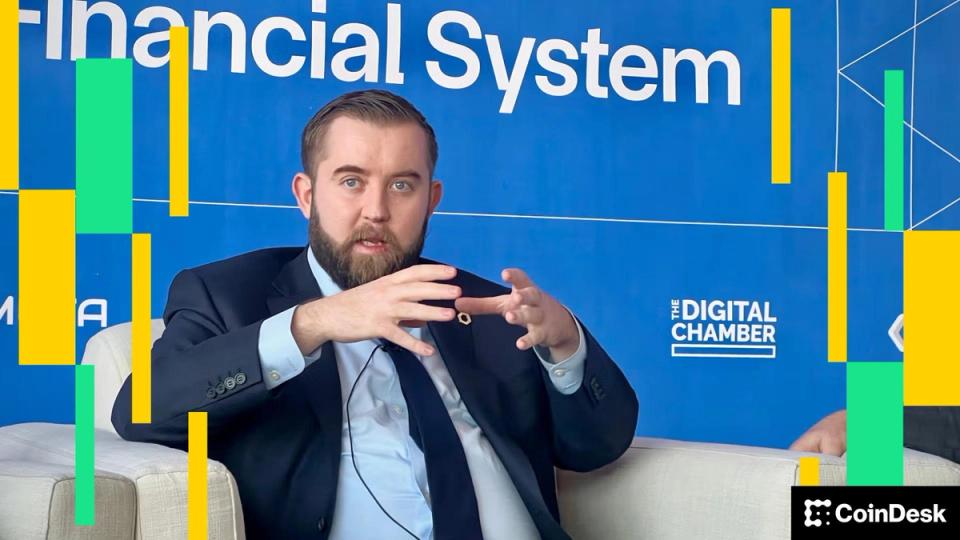Enough US Senate Democrats still show they are ready to pass a crypto market structure bill that the effort has legs, they said at a meeting of several crypto executives on Wednesday that focused on a path forward for US crypto regulation.
Digital asset company leaders had two meetings set for the same day, the first to discuss next steps with Democrats, whose votes will be needed to lift any bill above the Senate’s 60-vote threshold. The second meeting was with these lawmakers’ Republican colleagues, who have introduced a bill that is their response to the House Digital Asset Market Clarity Act.
“It is clear that there is a sufficient level of democratic support,” Chainlink CEO and co-founder Sergey Nazarov said in a statement to CoinDesk between meetings. He said more than 10 lawmakers attended, “all very committed to investing their time and effort in making the bill a success.”
Tensions have been rising between the parties and within crypto circles as the chances of Senate bandwidth grow smaller in 2025. When some Democratic decentralized finance (DeFi) bills were leaked recently, many in the industry viewed the ideas as a fatal blow to market structure negotiations. Some of them published these views.
The Democrats’ meeting featured some tough language over that tension, attendees said, but the policy gaps are likely not insurmountable.
“I think the friction is temporary and will soon resolve itself,” Nazarov said.
Kristin Smith, president of the Solana Policy Institute, told CoinDesk in an interview that the meetings have “reset the conversation,” but she said “we’ve got our work cut out for us” when it comes to getting lawmakers’ knowledge levels up to where they need to be to write the legislation.
The meeting between the industry leaders and Democratic lawmakers was reportedly to be chaired by Senator Kirsten Gillibrand, the New York Democrat who has advocated for tailored crypto regulations for years. Democrats showed great interest in addressing illicit financial concerns in the legislation, Nazarov said.
After the Republican meeting, a spokesman for Sen. Tim Scott, chairman of the Senate Banking Committee, issued a statement saying that Scott “urges Democratic colleagues to immediately return to the negotiating table, engage in serious bipartisan discussions, and provide meaningful feedback on our bill.”
With both parties and the industry back at the table this week, crypto leaders hope it starts the process. Coinbase CEO Brian Armstrong, who was scheduled to attend both meetings, had said in a post on social media X before the meetings that he was “excited to roll up his sleeves with key decision makers” to get the bill to President Donald Trump’s desk.
After the first meeting, he wrote again that the industry is “keeping the pressure on in DC” to pass a bill, and he also flagged a Stand With Crypto effort to rally support for it.
However, there are still a number of obstacles in that process. The Senate Banking and Agriculture Committee is set to advance the language to the full Senate, and the former is the only one to produce a draft so far. And if the Senate approves any bill, it must return to the House for a vote there before it can go to Trump for a signature.
Crypto votes in Congress have been a bright spot in US politics, with huge, bipartisan results for the recent bill to regulate stablecoin issuers and the House’s Clarity Act. But the legislation must be completed before it can win a vote.
“It’s really in everyone’s interest to get the bill passed — to get the digital asset community accepted by the U.S. government,” Nazarov said.
While the bill is the priority goal, Smith said failure to do so this year does not spell doom.
“All is not lost if we don’t get this done in the short term,” she said, citing the policy work being done at the Securities and Exchange Commission and the Commodity Futures Trading Commission, where both agencies are pushing into crypto policy writing and not waiting for new authorities from Congress. “We’re seeing real progress and real clarity that I think will be lasting in the end.”
UPDATE (October 22, 2025, 20:12 UTC): Adding comment from Senator Tim Scott’s office.
UPDATE (October 22, 2025, 21:06 UTC): Adding comments from Kristin Smith on Solana Policy Institute.



